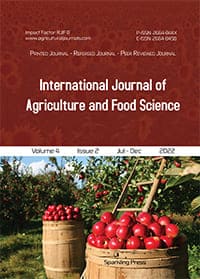


International Journal of Agriculture and Food Science is a peer-reviewed, refereed, and NAAS-rated agriculture journal publishing high-quality research in agriculture, food technology, crop science, and nutrition. Recognized as a leading agriculture and food science journal, it is indexed in reputed databases and trusted by researchers worldwide. The journal ensures academic integrity through a rigorous review process and ethical publishing standards. The journal follows COPE (Committee on Publication Ethics) guidelines and maintains transparency in editorial decisions.
As an international journal of food science, it covers topics like sustainable farming, soil and crop improvement, food safety, processing, and post-harvest management. With a growing readership and an established impact factor, it provides a reliable platform for academicians, policymakers, and industry professionals to share innovations that shape global agriculture and food systems.
The journal offers global visibility, fast and transparent review processes, and adherence to strict ethical publishing practices. For foundational knowledge, readers may refer to Food Science (Wikipedia). For policy resources, visit the USDA. We also emphasize responsible use of research metrics; for context, see Impact Factor Explained. Recognition and evaluation benchmarks can be found at the NAAS Website.
Authors ready to contribute can submit their manuscripts through our Online Submission Portal.
The International Journal of Agriculture and Food Science is recognized for its credibility, reach, and scholarly influence. With a growing readership across continents, the journal has established itself as a reliable platform for quality research dissemination. The Journal is Indexed and Abstracted in the Following Databases






The year 2025 marks a transformative phase for global agriculture and food science, where innovation and sustainability converge to address the challenges of climate change, food security, and nutritional quality. The integration of precision agriculture, biotechnology, and digital farming systems is reshaping traditional farming into a data-driven, resource-efficient enterprise. Farmers are increasingly adopting AI-based crop monitoring, IoT-enabled irrigation, and drones for pest and nutrient management, ensuring higher yields with minimal environmental impact. [ Learn More ]